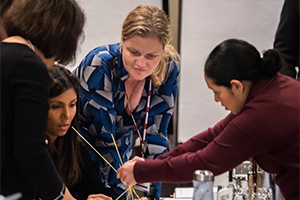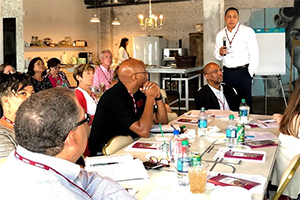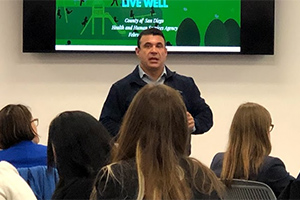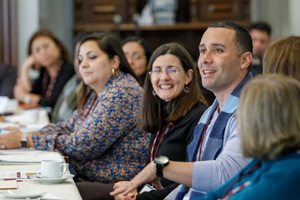DEFINING THE MISSION
Charting a Course to the North Star of Social and Economic Mobility
The Next Generation of Human Services Organizations Initiative was designed to co-create and advance solutions that improve social and economic mobility with an applied racial equity lens.
Social mobility is the movement of individuals, families, and households between social strata. Economic mobility is the ability of an individual, family, or some other group to improve their economic status – usually measured in income, but also potentially including other assets and resources.
Advancing social and economic mobility is one of the most pressing challenges of our time. Equity in the hope and realization of building a better life helps hold the social fabric of communities and the nation together. Yet by many indicators, social and economic mobility is declining in the United States. By broad measures, the middle class of the country is shrinking while the rate of extreme wealth and those in deep poverty are rising. To exacerbate these trends, as climate change increasingly impacts the country, the linkage between environmental justice and social and economic mobility will be integral to the future of healthy and resilient neighborhoods as well as safe and thriving families.
KEY INSIGHT
Social mobility is the movement of individuals, families, and households between social strata.
Economic mobility is the ability of an individual, family, or some other group to improve their economic status.
When viewed from a race-based lens, structural and systemic barriers to social and economic mobility are even more stark. For example, in the United States, the median white family had more than ten times the wealth of the median Black family in 2016, and the gap between Black and white families grew by $54,000 from 1992 to 2016. The generational effects of this gap result in an array of negatives outcomes, such as the fact that in 99 percent of neighborhoods in the United States, Black boys earn less in adulthood than white boys who group in families with comparable income, and 70 percent of middle-class black children are likely to fall out of middle-class as they move into adulthood. Apart from the social and human cost of decline in social and economic mobility is the economic cost. The nation’s growth and prosperity are suppressed by inequality. For example, according to recent analysis by McKinsey & Co, closing the racial wealth gap could grow US Gross Domestic Product six percent by 2028, thereby lifting all people to a brighter future.
The Next Generation of Human Services Organizations Initiative has made progress on lifting all people to a brighter future by advancing the policies, institutions, organizations, systems and services that provide the platform for growth in social and economic mobility. The cohort – chosen for their ability to achieve new levels of outcomes and value, advance two-generation approaches, make data-informed decisions, advance racial equity in order to accelerate social and economic mobility, and drive large-scale person centered systems change began their learning journey at Harvard, November 3-5, 2017.

The Learning Journey & Experience
November 2017
The learning journey began at Harvard, November 3-5, 2017. During their first Leadership Academy, the group explored the Human Services Value Curve and delved into leadership and teamwork lessons with Dr. David Ager of Harvard Business School. The cohort reflected on new outcome measures, “question zero,” and logic models with Dr. Julie Boatright Wilson of Harvard Kennedy School, considered historical lessons on innovation and transformation with Dr. Antonio Oftelie of Leadership for a Networked World and the Harvard John A. Paulson School of Engineering and Applied Sciences, and applied new principles and frameworks to enhance strategic persuasion with Lauren Hirshon of Leadership for a Networked World and the University of Pennsylvania. The group also decided to engage in a cohort action plan together that would become a cornerstone of their two-year journey.

March 2018
In March of 2018, the group convened in Miami, Florida. They began with a “Catalyst Miami Experience,” learning steps the organization has taken to cultivate a culture of innovation and continuous improvement, meeting key partners and members of the community, reflecting on the unique policy and advocacy climate in Miami, and gaining insights from the organization’s recent leadership succession. Cohort members then came together to begin developing, refining and adopting a vision.
Building off an Appreciative Inquiry (AI) model, which is the cooperative search for the best in people and their organizations, the group explored their common values, core strengths, and hopes and wishes for the field. Through the process, the cohort acknowledged that: achieving racial equity and building strong and sustainable families and communities will require transformational change in the way the nation builds ladders out of poverty and bridges to prosperity. This work is imperative, as the unrelenting forces of social, economic, and technological shifts are catalysts for both promise and peril in racial equity, social and economic mobility, and prosperity.
The cohort agreed that now is the time for a renewed call to action. And, now is the time to bring forward the human services of the future. The cohort decided to focus their work together on developing strategies, tactics, and approaches to increase racial equity to advance their North Star of social and economic mobility.

August 2018
In August of 2018, the group met in Detroit and Troy, Michigan. As part of their Detroit experience, they heard from Jesús Gerena and Kofi Kenyatta of the Family Independence Initiative, who shared their strategy for investing in families with low incomes to achieve prosperity. Dr. Darrick Hamilton of Ohio State University presented provocative data on the causes, consequences and remedies of racial and ethnic inequality in economic and health outcomes, including an examination of the intersection of identity, racism, colorism, and socioeconomic outcomes.

February 2019
In February of 2019, the cohort met in San Diego, California. They began their work together with an Innovators tour, learning about the county’s population-based strategy, Live Well, San Diego, to cultivate an ecosystem that addresses not only the health needs of citizens, but also the vital human services that lead to thriving communities. Together, the group reflected on successful strategies to bring together diverse stakeholders with divergent views, discussed how a resilient ecosystem responds to eco-trauma, and talked about strategies to create a social movement to advance an inclusive economy.
Through a World Café session, the cohort continued their work together to build organizational capacity and activate new strategies and solutions that achieve racial equity in social and economic well-being. In particular, they had in-depth conversations on steps they have already taken to advance racial equity within their organizations and communities, lessons learned while engaging in this work, new action steps to commit to in order to accelerate this work, and a vision for the future.

June 2019
In June of 2019, the cohort traveled to Montgomery, Alabama. The keystone of the convening was a powerful trip to the Legacy Museum and the National Memorial for Peace and Justice. Individually and collectively, the group reflected on the history of racial inequality and economic injustice in the United States, the thread connecting slavery to reconstruction to segregation to lynching to the criminal justice system, mass incarceration, and death row, and the narratives that have sustained injustice across generations.
The following day, Yolo Akili Robinson of the Black Emotional and Mental Health Collective (BEAM) worked with the cohort on emotionally intelligent leadership training to raise awareness about unconscious biases, examine their communication styles, and inform their efforts to advance racial equity within their organizations and communities.

November 2019
In November of 2019, the group returned to Harvard University for their final Leadership Academy. They reflected on the progress they had made in their organizations and communities, organizational and leadership insights gleaned over their two-year journey, how their thinking about racial equity and social and economic mobility had evolved, how to bring lessons from the cohort experience back to their organizations, and what insights they could offer to the broader field.
Dr. Nancy Koehn, of Harvard Business School, concluded the experience by illuminating lessons learned from her most recent book Forged in Crisis – The Power of Courageous Leadership in Turbulent Times, and connecting these insights to today’s challenges and opportunities in health and human services.
Throughout the two years, cohort members also worked together virtually via a community of practice. In advance of in-person sessions, members reflected on their progress along the Human Services Value Curve (HSVC), the pressure they faced to improve service capacity and outcomes, enablers and barriers to progress, and technical and adaptive challenges. They also shared strategies, techniques, tools, ideas, and learnings to accelerate progress along the four dimensions of the HSVC: Governance and Structure, Insight and Evidence, Services and Solutions, and People and Culture.
After deciding to engage in a cohort action plan together, the group communicated virtually to identify potential areas of interest. And, when they had agreed to focus on increasing racial equity to advance social and economic mobility, they shared frameworks, definitions of key terms, and commitments to actions steps they would each take within their organizations and communities virtually. Through the online community of practice, they continued to coach and support each other by sharing barriers and challenges they were encountering in advancing their action steps, and offering their peers advice, suggestions, and feedback.
Finally, as the program came to an end, they offered reflections on the experience and shared their accomplishments and impact over the two-year journey.